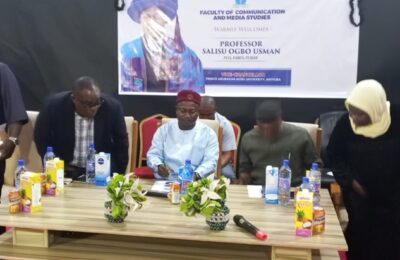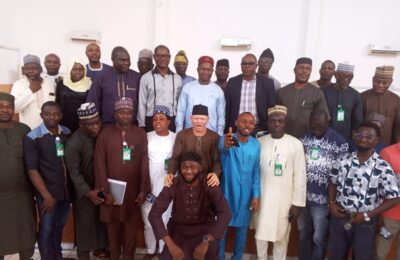By Musa Bakare.
There comes a time in the life of a people when silence becomes complicity and complacency becomes betrayal. For too long, the people of Kogi West Senatorial District have watched from the sidelines as the political table of the state is set, and others partake of the main course, while Kogi West is handed crumbs and tokenistic offerings: a handful of appointments, a sprinkling of projects, and promises that evaporate before the elections are even over.
It is a painful irony that people so blessed with accomplished sons and daughters, men and women of intellect, exposure, and administrative competence appear to continue to accept such marginalization with folded arms.
Kogi West, industrious, educated, and culturally refined, has long been recognized as one of the most organized blocs in Kogi State. Yet politically, we remain at the mercy of others, content with symbolic gestures instead of demanding our rightful place at the center of governance.
Worse still, attempts are often made to pitch the Okun people against their brothers and kinsmen from Lokoja and Kogi (Koto Karfi) Local Government Areas, all within the same senatorial district, for narrow political expediency.
This culture of tokenism did not emerge overnight. It has been nurtured by years of divide and rule strategies from outside the district, internal disunity, political short sightedness, and the absence of a coherent, collective leadership agenda.
The people of the District, instead of speaking with one voice, have too often allowed themselves to be divided by party affiliation, personal ambition, or the lure of temporary gains. Consequently, every election season finds us negotiating from a position of weakness rather than strength.
The politics of tokenism is a subtle but deadly tool. It pacifies a people with just enough to silence their agitation and massage their egos, yet never enough to change their condition. When proud people begin to applaud appointments that should be routine or celebrate roads that barely connect their communities, it means they have been conditioned to expect little and to be grateful for less.
Kogi West deserves better. We have produced men and women of integrity and intellect who have excelled in the military, civil service, academia, business, and politics. Yet when decisions about Kogi’s leadership are made, we are often consulted as an afterthought. How long will we continue to exchange collective power for personal favors? How long will we be satisfied with the politics of presence instead of the politics of power?
The time for awakening is now. The people of Kogi West must choose dignity over dependency, power over placation, and unity over division. Our future, and indeed our honor depends on it.
I challenge our political leaders and elders to rise above self-interest and external manipulation. Senator Smart Adeyemi, Senator Sunday Karimi, Hon. Elder Leke Abejide, Hon. Samuel Aro, Hon. T.J. Yusuf, Hon. Salman Idris, Hon. Aguye Suleiman Danladi, Hon. Suleiman Baba Ali, Barrister Shola David Ayedogbon (Chavid), and several others must close ranks and work for a common cause in the interest of our people.
With the support of respected elders such as General Tunde Ogbeha, General Julius Olakunle Sunday Oshanupin, Rt. Hon. James Abiodun Faleke, Barrister Bayo Ojo (SAN), Chief Tunde Ayeni, Chief Jide Omokore, Prince Shola Akomode, and many others, we can rescue our people and our fatherland and set a new political and social agenda for Kogi West.
As 2027 approaches, we stand at a crossroads once again. The coming election is not just about who governs Kogi State, it is about whether Kogi West will finally rise from political complacency and demand equity. The time for pleading has passed; the time for strategic engagement has come. We must move from being political spectators to becoming decisive players.
To achieve this, we must first heal our internal divisions. Kogi West must speak with one voice, from Ijumu to Kabba-Bunu, Mopa- Amuro to Yagba East, Yagba West, Lokoja, and Kogi (Koto Karfi). We must build a united political structure that transcends party lines and personal interests. Our traditional rulers, elders, youth, and political leaders must come together to define a clear agenda, one that articulates what we want, what we deserve, and what we will no longer accept.
We must also understand that no group gives up power voluntarily. Power must be negotiated, with wisdom, backed by numbers, and strengthened by unity. Political appointments and commissioner slots are not substitutes for leadership. Representation without empowerment is an illusion. Development without decision making power is dependency.
Kogi West must therefore reject the politics of tokenism and embrace the politics of dignity. We must stop celebrating crumbs when we can own the bakery. Our destiny cannot continue to depend on the goodwill of others but on the strength of our organization and the clarity of our vision.
The 2027 election offers an opportunity for the sons and daughters of Kogi West to prove that we have learned from the past. Let us rise above narrow interests and insist on a fair share of power within the context of justice, equity, and competence. Let no one divide us again with temporary promises or pit one community against another.
History has been patient with us, but history will not wait forever. If Kogi West fails to rise now, future generations will remember not those who oppressed us, but those who accepted oppression in exchange for tokenistic offerings.
– Musa Bakare is a political analyst and public affairs commentator. He writes from Lokoja, Kogi State.




